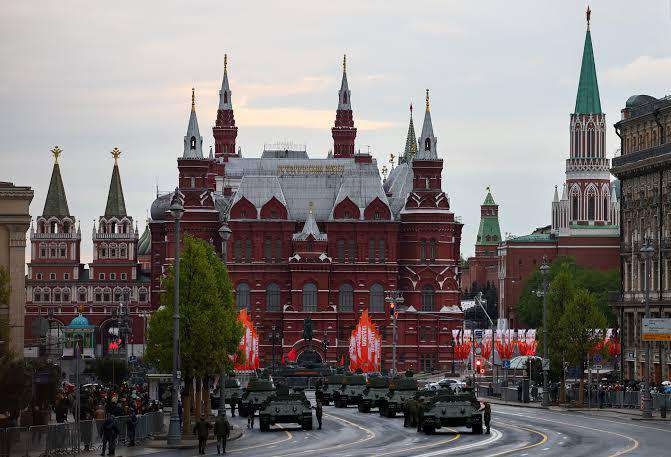Nation
Russia marks 80th Victory Day with military parade, global guests, and wartime rhetoric

Russia marked the 80th anniversary of Victory Day on Friday with a grand military parade on Red Square, drawing a mix of global leaders, intense wartime symbolism, and renewed defiance amid its prolonged invasion of Ukraine.
More than 11,000 troops marched through the heart of Moscow as President Vladimir Putin presided over the annual commemoration of the Soviet Union’s triumph over Nazi Germany in World War II. This year’s celebrations came with elevated stakes and symbolism, over three years since Russian forces launched their full-scale assault on Ukraine.
Alongside Russian troops were over 1,500 servicemen who had fought in the so-called “special military operation,” Moscow’s term for the war in Ukraine. Soldiers from allied nations also joined the procession — though noticeably absent were North Korean troops, despite growing military ties between Moscow and Pyongyang. Later in the day, Putin met privately with North Korean officers and praised their role in fighting Ukrainian forces in the border region of Kursk.
Putin’s Victory Day speech struck a nationalistic tone, lauding the Russian military’s courage and accusing unnamed adversaries of attempting to distort the historical legacy of the Second World War.
“Truth and justice are on our side,” he said. “Russia will remain an invincible defender against those who support Nazism, Russophobia, and anti-Semitism.”
The president also made a subtle nod to recent criticism from U.S. politicians and Ukrainian officials who have questioned the parade’s messaging. “We see attempts to slander the real victors of the war,” Putin declared.
Unusually, Putin did not dwell extensively on the war in Ukraine or deliver pointed attacks against Western governments, a departure from his combative tone in past speeches. In 2024, he used the occasion to accuse “Western elites” of fomenting global instability.
The parade featured nearly 200 military vehicles, including the iconic WWII-era T-34 tank, alongside newer armored carriers, artillery systems, drones, and aircraft. A flyover of fighter jets and strategic bombers capped the display of Russia’s firepower.
The Kremlin had extended invitations to dozens of foreign dignitaries. Among those in attendance were Chinese President Xi Jinping, Brazilian President Luiz Inácio Lula da Silva, and Venezuelan President Nicolás Maduro — signaling continued ties between Moscow and a coalition of non-Western powers.
European representation was sparse, limited to Serbian President Aleksandar Vučić and Slovak Prime Minister Robert Fico. Leaders from Azerbaijan and Laos canceled their trips at the last minute.
U.S. Ambassador Lynne Tracy was reportedly invited, but her attendance could not be confirmed. No high-ranking Western officials were visibly present.
In the lead-up to the parade, Moscow imposed tight security. Restaurants and shops along the parade route were shuttered — an unusual precaution believed to be linked to fears of sabotage or terrorist attacks. The city has been the target of several bombings since the Ukraine invasion began, including the killing of army general Yaroslav Moskalik on April 25.
City-wide internet outages were reported throughout the week, with further disruptions logged in cities like St. Petersburg, Kazan, and Novosibirsk, where parallel parades were held.
The celebrations took place under the cover of a Kremlin-declared ceasefire from May 8 to May 11. But Ukrainian officials dismissed the move as a publicity stunt, reiterating their support for a broader, 30-day ceasefire proposed by Washington in March. Both sides have since accused each other of violating the truce.
In Russia’s border region of Belgorod, Ukrainian drone attacks were reported shortly before local Victory Day events were set to begin. Regional authorities vowed the commemorations would continue despite the strikes.
The juxtaposition of military pomp in Red Square and security anxieties across the country underscored the delicate balance Putin faces as he tries to rally national pride while waging an increasingly costly war.
Victory Day — once an unifying symbol of past triumph — has now become a stage for geopolitical alignment, domestic propaganda, and a sharpening divide between Russia and the West.


